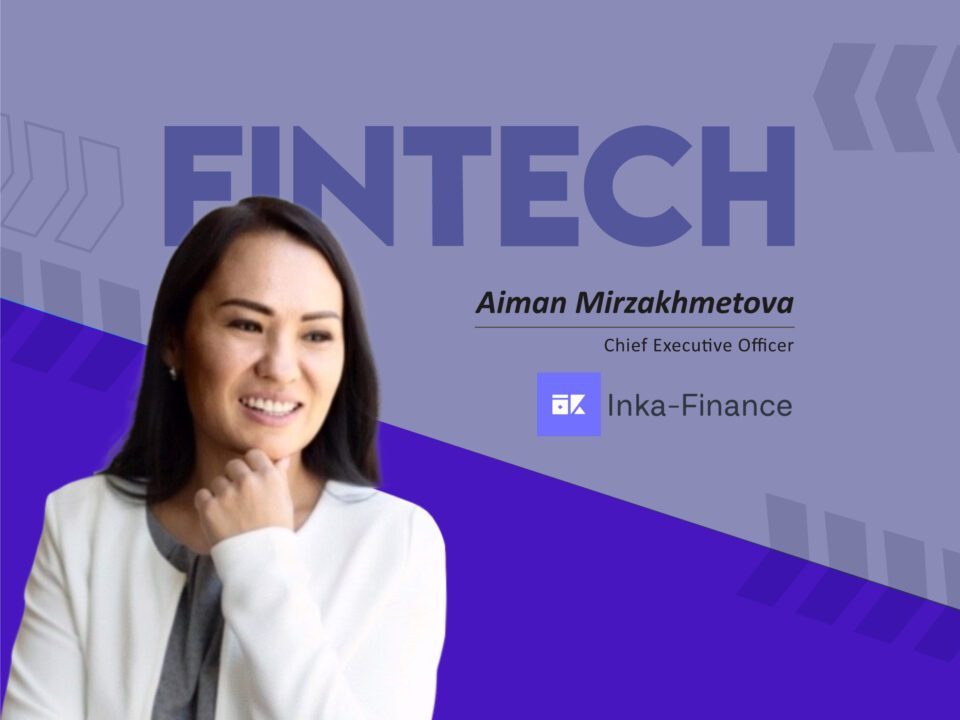Hi Aiman, welcome to our Fintech Interview Series. Please tell us about your 15 years of tech journey so far.
I am a Financier by background, I have been working for many years as a CFO in a Holding company with an annual turnover of more than $100 million. My great passion for finance led me to blockchain technology. I have studied blockchain technology in depth, in particular decentralized finance called DeFi.
DeFi gives you both control and transparency over your finances, as well as access to global markets and alternatives for your banking options. Inspired by the capabilities of DeFi, we created an Inka Finance startup with blockchain engineers. Inka Finance is a сross-chain and DeFi in one click global Web3 startup backed by NetworkVC Venture Partners Accelerator (New York, USA).
Aiman, you are also a mentor at Hypernest, an early-stage blockchain startup. Could you cite a few challenges that you are facing at your blockchain startup?
HyperNest has the highest expertise in screening startups from around the world and selects only 1% of the startups in DeFi to focus on. Also, HyperNest has selected the best global mentors at DeFi, who cover expertise in themes such as technology, security, Tokenomics, growth, marketing, and fund-raising.
Therefore, mentoring at HyperNest provides a unique opportunity to interact with industry experts and investors and get an exclusive inside look at the most innovative startups participating in the program.
Also Read: Global Fintech Interview with Ramesh Menon, Group Director, Product Management at LSEG
How exactly does DeFi contribute toward the Fintech domain?
DeFi revolutionizes the Fintech domain by democratizing financial services and introducing programmable money through smart contracts. It empowers individuals globally, providing access to diverse financial products without intermediaries. Smart contracts automate agreements, enhancing efficiency and reducing the risk of human error. DeFi fosters financial innovation, allowing developers to build new applications and models on open-source protocols.
However, challenges such as regulation, security, and scalability need to be addressed. As a DeFi startup CEO, I navigate these challenges by collaborating with regulators, implementing robust security measures, and leveraging scaling solutions. Our mission is to drive DeFi adoption while shaping the future of finance through innovation and responsible practices.
What are the current issues faced by emerging DeFi services? Could you cite a few examples with solutions?
One of the current issues faced by emerging DeFi services is the issue of security. While DeFi offers decentralized and open access to financial services, it also exposes users to risks such as smart contract vulnerabilities and hacking attempts. To address this, DeFi platforms can employ rigorous security audits, implement bug bounty programs, and promote responsible coding practices.
Another challenge is scalability. As DeFi gains popularity, network congestion and high gas fees become prevalent, hindering the user experience. Layer 2 solutions, such as sidechains and state channels, can help alleviate these issues by processing transactions off-chain and reducing costs.
Interoperability is also a concern. DeFi services often exist in isolated ecosystems, limiting their potential. Bridging networks and fostering interoperability protocols can enable seamless communication and value transfer between different DeFi platforms.
By addressing these challenges through continuous innovation, collaboration, and adherence to best practices, the emerging DeFi sector can overcome obstacles and unlock its full potential in revolutionizing the financial landscape.
Could you please explain what are “DApps” and “non-custodial wallets”?
DApps, or Decentralized Applications, are blockchain-based applications that operate on decentralized networks, offering users direct control over their data and assets. They use smart contracts to enforce transactions and eliminate the need for intermediaries.
Non-custodial wallets give users complete ownership and control over their funds and private keys. Unlike custodial wallets, which rely on third-party services, non-custodial wallets prioritize user security and privacy by allowing direct access to assets.
In summary, DApps are decentralized applications that leverage blockchain technology, while non-custodial wallets provide users with full control over their funds and private keys. Both contribute to the principles of decentralization, trustless transactions, and user empowerment in the realm of blockchain and DeFi.
Also Read: Global Fintech Interview with Michael Rangel, Founder and CEO at Novo
Statistics have shown that 95% of the total Blockchain participants are men compared to the minute 5% made up of females. What is your take on this?
The gender gap in blockchain participation, with 95% men and only 5% women, is a concerning statistic. To address this, we must prioritize diversity and inclusion. Educational initiatives, mentorship programs, and networking opportunities can encourage women’s participation. Creating a culture of inclusivity within organizations and communities is crucial. By providing resources, support, and equal opportunities, we can empower women in blockchain. Closing the gender gap requires a collective effort from industry leaders and the community. By actively working towards inclusivity, we can drive positive change and create a more balanced and diverse blockchain ecosystem.
What one piece of advice you would like to give to a Blockchain Project on better strategies needed for a sustainable business?
One piece of advice I would offer to a blockchain project seeking sustainable business strategies is to prioritize long-term value creation. Rather than focusing solely on short-term gains or hype-driven trends, it is important to build a solid foundation and roadmap for the project. This involves thorough market research, understanding user needs, and developing a clear value proposition.
Additionally, fostering strong partnerships and collaborations within the blockchain ecosystem can provide valuable resources and expertise. Embracing regulatory compliance and actively engaging with stakeholders and the wider community helps build trust and credibility. Finally, continuous innovation and adaptability are key in the rapidly evolving blockchain landscape. By staying ahead of the curve, addressing challenges proactively, and maintaining a user-centric approach, a blockchain project can increase its chances of long-term success and sustainability.
What figure of CAGR do you see for the DeFi industry in 2030?
Predicting the exact Compound Annual Growth Rate (CAGR) for the DeFi industry in 2030 is challenging, but industry reports provide insights into its growth potential. According to a report by Grand View Research, the global decentralized finance market size is expected to reach USD 231.0 billion by 2030, growing at a CAGR of above 40%. This highlights the significant growth prospects for the DeFi industry. Factors driving this growth include the increasing adoption of blockchain technology, rising demand for transparent and secure financial services, and the rising interest from the largest institutional players such as JP Morgan and BlackRock contribute to this growth. The projected CAGR and market size suggest a positive outlook for the DeFi industry, driven by both technological advancements and institutional participation.
Given a chance, to change any one thing about the blockchain industry, what would it be?
I would focus on enhancing scalability and interoperability. While blockchain technology has shown great potential, it still faces challenges in terms of transaction speed and the ability to seamlessly communicate with other blockchain networks. Improving scalability would allow for faster transaction processing, making blockchain more practical for mainstream adoption.
Additionally, enhancing interoperability would enable different blockchain platforms to communicate and share data, fostering collaboration and expanding the possibilities for decentralized applications. These improvements would contribute to a more efficient and interconnected blockchain ecosystem, unlocking greater value and accelerating the growth and adoption of blockchain technology across various industries.
Also Read: Global Fintech Interview with Paul Monk, Chief Executive Officer at Alpha Development
Tag (mention/write about) the one person in the tech industry whose answers to these questions you would love to read!
Matthew de la Fuente
Thank you, Aiman! That was fun and we hope to see you back on globalfintechseries.com soon.
[To share your insights with us, please write to sghosh@martechseries.com]
Aiman Mirzakhmetova has 18+ years experience with a strategic management competence in the roles of CFO, COO, CEO, Board Member in corporate companies with an annual turnover above 100 mln USD.
Aiman Mirzakhmetova has a Master’s degree in Economics (Financial Analysis) and receives Global Executive MBA degree from Kellogg School of Management (USA) and WHU – Otto Beisheim School of Management (Germany).
She founded “Cross-chain swap and DeFi in One Click” global Web3 startup, developing a user-friendly all-in-one platform, having the vision to simplify crypto to users, providing access to all benefits of DeFi Ecosystem. Aiman Mirzakhmetova is a Mentor of Web3/DeFi startups in the international accelerators brinc.io based in Hong Kong and hypernest.xyz based in Portugal.
Inka Finance is a “Cross-chain and DeFi in One Click” global Web3 startup supported by NetworkVC Venture Partners Accelerator (NYC, US). Inka Finance is a multichain platform – unifying 10+ blockchain networks, best-in-class DeFi services providing access to 30% liquidity out of the Total Value Locked (TVL), 100+ cryptocurrencies to swap. Inka Finance has already partnered with fiat-crypto payment system Transak, supported by Visa and Mastercard in 125 countries.

